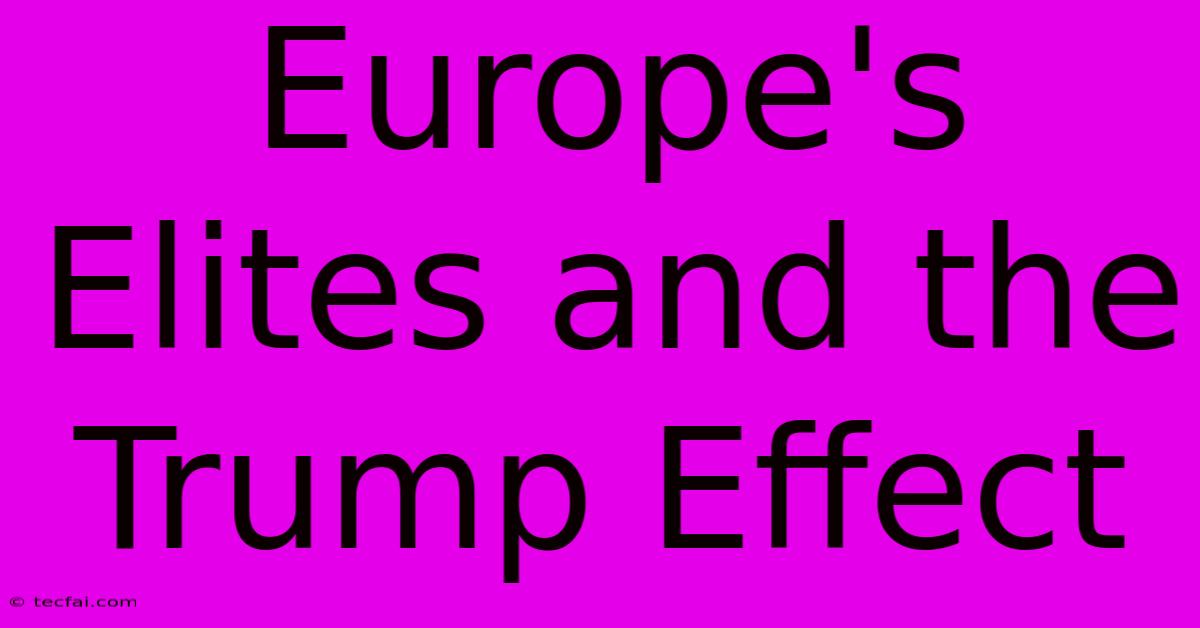Europe's Elites And The Trump Effect

Discover more detailed and exciting information on our website. Click the link below to start your adventure: Visit Best Website tecfai.com. Don't miss out!
Table of Contents
Europe's Elites and the Trump Effect: A Transatlantic Shift in Power Dynamics
The election of Donald Trump as President of the United States sent shockwaves across the globe, but perhaps nowhere were those tremors felt more acutely than in Europe. The Trump presidency, characterized by its unconventional approach to foreign policy and its populist rhetoric, profoundly impacted the relationship between the US and Europe, forcing a reassessment of transatlantic alliances and prompting significant shifts within European elite circles.
The Erosion of Trust and the Rise of Uncertainty
Trump's "America First" policy directly challenged the established post-World War II international order, which had been largely underpinned by strong US-European cooperation. His questioning of NATO's relevance, his criticisms of European Union policies, and his withdrawal from the Paris Agreement on climate change created a climate of profound uncertainty amongst European elites. This uncertainty wasn't just about specific policy disagreements; it was a fundamental questioning of the reliability of the United States as a strategic partner.
This erosion of trust forced European leaders to reconsider their reliance on the US security umbrella and to reassess their own foreign policy strategies. The perceived unreliability of the US pushed many European countries to strengthen their own defense capabilities and to seek closer ties with other international partners, including those outside of NATO.
A Boost for European Populism and Nationalism?
While some argue that Trump's presidency solidified transatlantic divisions, others contend that it inadvertently boosted the rise of populist and nationalist movements within Europe. Trump's success provided a potent example – a seemingly impossible victory – for right-wing populist leaders across the continent. His rhetoric, often characterized by anti-establishment sentiment and a rejection of globalism, resonated with similar movements in Europe, providing them with a blueprint for success and legitimizing their own agendas.
This doesn't mean that all European populist leaders directly mirrored Trump's policies or rhetoric. However, the Trump presidency offered a compelling case study in how to mobilize a disaffected electorate and challenge the established political order. This undeniably impacted the political landscape of many European nations.
Strengthening European Integration or Fragmentation?
The Trump effect on Europe wasn't uniform. Some argued that it galvanized European leaders to strengthen their own integration and present a unified front against the perceived unpredictability of the US administration. This spurred discussions about greater European defense cooperation and a more assertive European role in global affairs.
However, others contend that the Trump presidency exacerbated existing divisions within the European Union, highlighting the inherent tensions between member states with differing national interests and priorities. The lack of a consistent US approach created space for these internal disagreements to fester, potentially hindering the EU's ability to act decisively on the international stage.
The Long-Term Implications
The long-term consequences of the Trump effect on Europe are still unfolding. While the immediate impact was marked by uncertainty and a reassessment of transatlantic relations, the broader implications are multifaceted and complex. The need for Europe to become more strategically autonomous is undeniable, but the path towards that autonomy remains fraught with challenges. The future of the transatlantic relationship will depend on the willingness of both sides to navigate these complexities and rebuild trust.
The legacy of the Trump presidency, both in terms of its impact on European politics and its broader influence on the global order, will continue to be debated and analyzed for years to come. The shifts in power dynamics that it instigated are likely to have lasting effects on the international landscape. Understanding this complex interplay between Europe's elites and the Trump effect is crucial to grasping the evolution of the 21st-century geopolitical order.

Thank you for visiting our website wich cover about Europe's Elites And The Trump Effect. We hope the information provided has been useful to you. Feel free to contact us if you have any questions or need further assistance. See you next time and dont miss to bookmark.
Featured Posts
-
Anne Curtis Sa Madame Tussauds Hong Kong
Dec 01, 2024
-
Watch Ironman 70 3 Western Australia Live
Dec 01, 2024
-
Oilers Top Utah Hints Of Last Years Play
Dec 01, 2024
-
Slots Liverpool Vs Man City Lineup
Dec 01, 2024
-
Hurricanes Eye Bounce Back Vs Panthers
Dec 01, 2024
